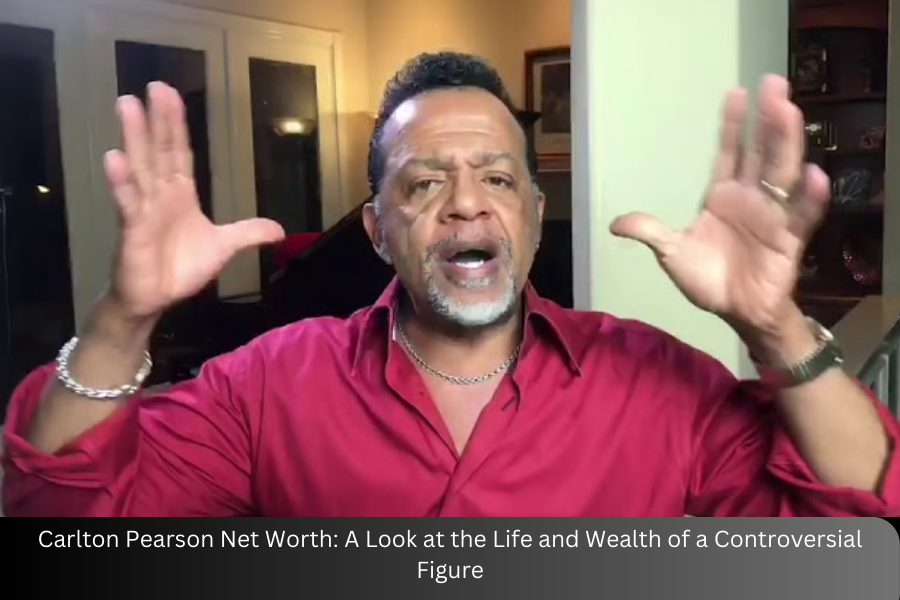Introduction
Carlton Pearson is a name that has been synonymous with success, controversy, and transformation. A former evangelical preacher turned progressive spiritual leader, Pearson’s career has been filled with significant highs and dramatic lows. From leading a megachurch to becoming a divisive figure in religious circles, Pearson’s journey is one of reinvention and resilience.
In this article, we will explore Pearson’s rise to fame, his wealth, and the factors that have contributed to his financial success and challenges over the years. We will also dive deep into his theological shift, which played a significant role in reshaping both his career and Carlton Pearson Net Worth. This analysis provides a comprehensive understanding of the factors that have made Carlton Pearson both a successful and controversial figure.
Early Life and Career Beginnings
Carlton Pearson was born on March 19, 1953, in San Diego, California. Raised in a deeply religious household, Pearson was exposed to the Pentecostal faith at a young age. He grew up with a passion for music and the church, which would eventually become the cornerstone of his career. He was known for his musical talent and his ability to lead a congregation with charisma and energy.
After moving to Tulsa, Oklahoma, Pearson became involved with a local church and began his journey as a preacher. He quickly rose through the ranks of the Pentecostal community, largely due to his dynamic speaking style and deep understanding of theology. Pearson became the pastor of Higher Dimensions Family Church, a church that would play a significant role in his rise to prominence.
Wiki
| Attribute | Details |
| Full Name | Carlton D. Pearson |
| Born | March 19, 1953 |
| Place of Birth | San Diego, California, USA |
| Profession | Preacher, Author, Musician, Televangelist |
| Known For | Founding Higher Dimensions Family Church, The Gospel of Inclusion |
| Net Worth | Estimated at $5 million |
| Church | Higher Dimensions Family Church (Formerly) |
| Theological Shift | Embraced Universal Reconciliation theology |
| Controversy | Rejected by many evangelical leaders for his progressive theology |
| Spouse | Gina Pearson (married) |
| Children | Yes (children’s details not widely publicized) |
| Books | The Gospel of Inclusion (Bestseller) |
| Music Career | Gospel Music, Several Albums |
| Television | Hosted a televised ministry program |
| Primary Source of Income | Televangelism, Books, Speaking Engagements, Music |
| Current Residence | Tulsa, Oklahoma, USA |
| Website | N/A (various social media and personal sites) |
The Growth of Higher Dimensions Family Church
In the 1990s, Pearson founded the Higher Dimensions Family Church in Tulsa, Oklahoma, which soon grew into one of the largest and most influential megachurches in the United States. The church’s success was a direct result of Pearson’s ability to attract thousands of members, many of whom were drawn to his energetic preaching and commitment to contemporary issues. At its peak, the church had tens of thousands of members, and Pearson became a prominent figure in the world of Pentecostalism.
The church’s popularity was largely driven by Pearson’s ability to appeal to a wide demographic, from young people to families and senior citizens. His teachings, which often focused on prosperity theology, personal growth, and faith-based success, resonated with many individuals seeking guidance in their lives. His church became a hub for those seeking spiritual fulfillment and community, and it was no surprise when Higher Dimensions became a financial powerhouse.
The Financial Success of Higher Dimensions Family Church
The financial success of Higher Dimensions Family Church was a major factor in Carlton Pearson’s wealth. As the church grew, so did its revenue. Like many megachurches, Higher Dimensions was supported by tithes, offerings, and donations from its members. These funds allowed the church to expand its programs, build new facilities, and invest in outreach programs that spread Pearson’s teachings across the country.
In addition to traditional church income, Pearson’s ministry also received significant revenue through televangelism. His television program, which broadcast his sermons and teachings to a nationwide audience, became a lucrative part of his ministry. With his energetic presence and compelling messages, Pearson’s program attracted viewers who tuned in regularly for spiritual guidance and inspiration.
It wasn’t just the church’s members who contributed to Pearson’s wealth; his television ministry played a major role in drawing in additional financial support. His ability to connect with his audience through TV broadcasts and live events expanded his reach and generated significant revenue.
Theological Shift and Its Impact on Career and Finances
In the late 1990s and early 2000s, Carlton Pearson experienced a profound shift in his theological beliefs. Pearson began to embrace the idea of universal reconciliation, a controversial doctrine that asserts that all people, regardless of their religious background or beliefs, will eventually be reconciled with God. This idea was in stark contrast to the traditional Pentecostal teaching of salvation through faith in Jesus Christ alone.
Pearson’s acceptance of universal reconciliation led to a public theological crisis. His new beliefs were met with opposition from his fellow pastors and church leaders, many of whom labeled his views as heretical. The backlash was swift and severe, with many of Pearson’s followers leaving his church. His position in the evangelical community was increasingly threatened, and as a result, his financial base began to dwindle.
While Pearson’s views on universal reconciliation alienated him from the conservative Christian community, they also drew the attention of a new group of followers. His beliefs appealed to those who felt marginalized by traditional Christianity, including LGBTQ+ individuals, those with different religious backgrounds, and people seeking a more inclusive and progressive spiritual message. Although Pearson lost many of his original church members, he found new opportunities for ministry among this new audience.
The Fall of the Church and the Financial Decline
The doctrinal shift had a significant impact on Pearson’s wealth, as it led to a decline in the support he once enjoyed from his congregation. The Higher Dimensions Family Church, which had once been one of the largest megachurches in the country, began to experience a steady decline in membership. As the financial contributions from church members decreased, so did Pearson’s ability to fund his lifestyle and various projects.
In addition to losing members, Pearson also faced increased criticism and scrutiny from religious leaders who had once been his allies. Many of the church leaders in the Pentecostal community rejected Pearson’s new theology, accusing him of leading people astray. As a result, Pearson’s relationships with influential figures in the evangelical world became strained, and he lost out on opportunities for lucrative speaking engagements and collaborations.
The loss of influence and financial backing from the church left Pearson in a difficult position, and he was forced to reevaluate his ministry and financial strategy. Despite the setback, Pearson continued to speak out about his beliefs and refused to back down from his message of inclusivity and universal salvation.
Diversifying Income Streams: Books and Speaking Engagements
Despite the challenges that Pearson faced after his theological shift, he did not give up on his ministry. Instead, he diversified his income streams, tapping into new areas where he could share his message and continue to generate revenue. One of the most significant ways that Pearson was able to continue building his wealth was through writing books.
Pearson’s most famous book, The Gospel of Inclusion, became a bestseller and helped him reach a broader audience. The book delves into his controversial beliefs and offers a new perspective on salvation and the nature of God. It helped Pearson position himself as a thought leader in the spiritual and religious community and served as a major source of income.
In addition to his books, Pearson also embarked on a speaking tour, engaging with audiences who were interested in his message of inclusivity and spiritual growth. His speaking engagements, which often included public seminars, conferences, and workshops, became a key revenue source. Pearson continued to earn money by traveling and sharing his beliefs with those who were open to hearing his message.
Music and Other Ventures
Pearson’s diverse talents also contributed to his financial success. As a gifted musician, Pearson became involved in the gospel music scene, recording several albums and performing with renowned artists. His musical career provided an additional income stream, as he was able to earn royalties from his music and expand his brand within the Christian and gospel music industries.
While Pearson’s music career may not have been as lucrative as his ministry or television work, it added an important layer to his financial portfolio. His ability to engage with different forms of media and entertainment allowed him to remain relevant and continue generating income even as his church’s fortunes waned.
Carlton Pearson Net Worth
As of recent estimates, Carlton Pearson Net Worth is believed to be approximately $5 million. This figure takes into account his income from his church, television programs, books, speaking engagements, and music. However, Pearson’s wealth has fluctuated over the years, particularly after the theological shift that led to a decline in his ministry’s financial backing.
Despite the ups and downs, Pearson has been able to maintain a comfortable lifestyle and continue his ministry. He resides in Tulsa, Oklahoma, where he has a home and an office for his ministry. While his income from church donations may have decreased, Pearson has found new ways to generate revenue and remain a prominent figure in spiritual and theological circles.
Carlton Pearson’s Personal Life
Carlton Pearson’s personal life, much like his professional journey, has been marked by transformation. He has been married to Gina Pearson, a fellow pastor, and they have children together. His family has supported him throughout his career, and Gina has played a significant role in his ministry. Together, they have weathered many storms, including the public backlash and financial challenges that came with Pearson’s theological shift.
Throughout his life, Pearson has also been outspoken about his personal struggles, including the challenges of navigating the complexities of faith, family, and identity. His openness about his experiences has helped him connect with people from all walks of life, including those who may have faced similar struggles.
Conclusion
Carlton Pearson’s journey from a prominent evangelical preacher to a controversial figure in modern Christianity has been filled with both triumph and hardship. His financial success, especially during the height of his ministry at Higher Dimensions Family Church, was a direct result of his dynamic preaching, televangelism, and the widespread popularity of his church. However, his theological shift toward universal reconciliation, which challenged traditional Christian views, led to a decline in his wealth and influence within the evangelical community. Despite these challenges, Pearson’s ability to diversify his income streams through books, speaking engagements, and music has allowed him to rebuild his financial standing.
Today, Carlton Pearson Net Worth, estimated at around $5 million, reflects his resilience and adaptability. Though his journey has not been without controversy, it highlights the importance of staying true to one’s beliefs while finding new avenues for growth. Despite losing many followers along the way, Pearson’s unwavering commitment to his inclusive message and ability to diversify his career have allowed him to maintain a comfortable lifestyle and continue influencing those who resonate with his teachings.
FAQs
1. What is Carlton Pearson Net Worth?
As of recent estimates, Carlton Pearson Net Worth is approximately $5 million. This figure is based on his income from his church, televangelism, speaking engagements, book sales, and music career.
2. Why did Carlton Pearson’s wealth decline?
Pearson’s wealth began to decline after he publicly embraced the doctrine of universal reconciliation, which diverged from traditional Christian beliefs. This theological shift led to a loss of followers and financial support, as many of his church members and fellow pastors rejected his views.
3. How did Carlton Pearson rebuild his career after his theological shift?
After his theological shift, Pearson diversified his income streams by writing books, giving speaking engagements, and releasing music. He found a new audience among those interested in more progressive and inclusive religious views, which helped him continue generating income.
4. What is the Gospel of Inclusion, and how did it impact Pearson’s career?
The Gospel of Inclusion is a book written by Carlton Pearson that outlines his belief in universal reconciliation, the idea that all people will ultimately be reconciled with God, regardless of their religious background. The book became a bestseller and helped establish Pearson as a leading voice for progressive theology. However, it also contributed to his separation from the mainstream evangelical community, affecting his financial backing.
5. Does Carlton Pearson still lead a church?
While Pearson no longer leads the Higher Dimensions Family Church, he continues his ministry through public speaking, writing, and media. He has shifted to a more inclusive and progressive approach to spirituality, which attracts a different audience from his previous church members.
6. How did Pearson’s career impact the Pentecostal community?
Carlton Pearson’s career had a significant impact on the Pentecostal community, especially due to his controversial shift in theology. His embrace of universal reconciliation was seen as a threat to traditional Pentecostal beliefs, leading to a rift with many church leaders and a decline in his influence within the community. However, his message of inclusion and spirituality has resonated with other groups, allowing him to maintain a following despite the backlash.
7. What are some of Carlton Pearson’s other ventures?
In addition to his ministry and televangelism, Pearson has been involved in music, writing, and public speaking. He has recorded several gospel albums, written books such as The Gospel of Inclusion, and frequently speaks at conferences and workshops focused on spirituality and personal growth.
Discover the latest news and updates on Play Hop




